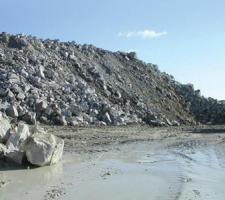For centuries production of an industrial mineral has shaped the Cornish countryside but Aggregate Industries is working to return it to its natural state
The landscape of one UK county could be set to change forever because of a boom in the demand for recycled and more sustainable sources of rock. For hundreds of years, unused by-product from the china clay industry in Cornwall has been abandoned as part of the process, creating huge piles of waste material, known locally as the Cornish Alps.
Many a tourist on holiday in the South West will have wondered whether the 'Alps' are a natural or man-made feature of the region, but the truth is that for every tonne of china clay produced, 9tonnes of waste is created which over the last 250 years, has helped shape the Cornish landscape.
At Melbur Quarry near St Austell, these waste or secondary products including rock, sand and gravel are being re-processed by
The deal is beneficial for both parties as Bardon Aggregates is currently re-processing the material, which would otherwise have gone to tip, for use in the construction industry in concrete and asphalt road surfacing. The recent construction of the new 11km A30 Bodmin to Indian Queens dual carriageway was completed using in excess of 800,000tonnes of secondary material from Bardon Aggregates sites in Cornwall, and the company is now supplying a number of other construction projects around the UK, as the demand for secondary aggregate continues to rise.
Bardon Aggregates, which is part of
In addition to winning an award for its environmental methods, Bardon Aggregates has further enhanced its sustainable credentials with the reintroduction of rail freight to transport material around the country. By sending 1200tonnes of material in a single trip to London by rail freight, up to 60 lorry movements are taken off busy roads, a move welcomed by the company and environmentalists alike.
Secondary aggregates are transported a short distance from the quarry to the railhead where it is loaded onto the early morning train bound for construction sites across the UK, with up to three trains a week leaving the South West.
Bardon estimate that 60% of the aggregates used in the county is derived from secondary sources with the majority of it coming from the china clay industry. In fact, the demand for secondary aggregate is actually outstripping the demand for the china clay from which it is derived.
Bardon commercial manager Guy Roseveare explained, "With everyone striving to meet sustainability targets the demand for secondary and recycled aggregates is soaring. Our partnership with Imerys has enabled us to take advantage of this lucrative sector at a time when the market holds some uncertainty.
The fact that it's a secondary material coupled with it being transported by rail means that it is a truly sustainable solution that is attractive to construction companies countrywide.
"We are now looking to the future and considering other potential markets outside of the South West that could be reused and turned into a suitable construction material." Bardon Aggregates recognised that the market for recycled rock in the South West was there to be exploited and is now working in conjunction with china clay company Imerys, to do just that.RSS














